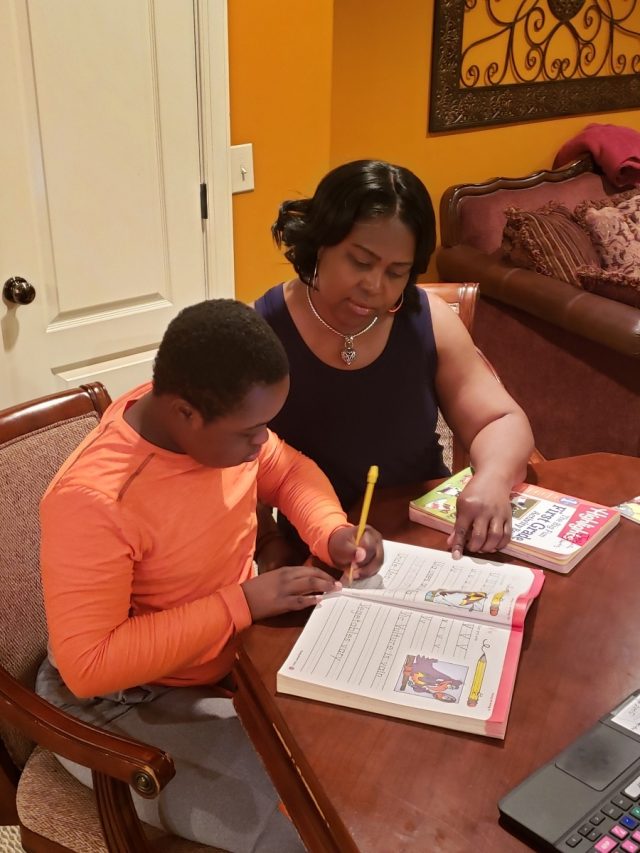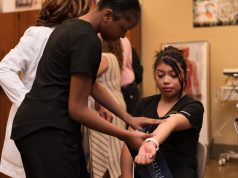
By Erica Wright
The Birmingham Times
Marcella Roberts is not concerned that her son Joshua, who has Down syndrome, will show signs of regression during the COVID-19 public health crisis. In fact, he hasn’t missed a beat.
“My son has a speech therapist, an occupational therapist, and an instructional support teacher, in addition to his regular teacher, who he connects with via Zoom meetings,” she said.
Roberts and her husband, Kevin, are both lawyers, and both are working from home like many professionals. They also spend time making sure their two sons, Joshua and his twin brother Kendal, turn in their assignments on time, as well as spend face-to-face time with Joshua to make sure he gets what he needs.
Joshua, a fifth grader at Brock’s Gap Intermediate School in Hoover, is just one of many students who have had to switch to distance learning as schools began closing in March. According to an article in the Hechinger Report, an online education website, advocates, educators, and parents say kids with disabilities are particularly vulnerable during this crisis and worry some may regress during the pandemic.
Roberts, who is the president of the board of directors for Down Syndrome Alabama, an organization that advocates and supports individuals with Down syndrome, said her son has the same support at home that he has at school.
“Teachers have provided parents with activities,” she said. “[Joshua] has a full deck for speech. For occupational therapy, I got a packet of information, so they check in with me on a regular basis to see how Joshua is doing. We work on occupational therapy and speech together, and then I send a copy of what he has done in those areas.
“I can schedule time for [the therapists] to connect with us via a Google Meet or something like that, so [Joshua] still has access. … Besides not being able to meet physically, he hasn’t missed a beat.”
Joshua also meets with his instructional support teacher once a week because it’s important for him to maintain the routine he had while school was open.
“For kids with Down syndrome, a schedule and repetition are key, so he knows what to expect,” Roberts explained. “We’ve got a school schedule in place. … Structure is critical and has been a lifesaver for us. We all get up and get dressed everyday, as if we are going to work or school. … We get up, eat breakfast, and start [working]. … That has helped the kids a lot because they know it is a school day.”
Each day, Joshua spends about 30 to 45 minutes on Google Meet with his teacher and classmates.
“One day, the [students] did a scavenger hunt in their houses,” Roberts said. “The teacher involves all of the kids, … [having them] play games to keep them engaged and to show them that e-learning can still be fun.”
With the summer approaching, Roberts said she plans to do what she has done in past years.
“I keep Joshua in regular, mainstream types of [summer enrichment] programs, so he’s not doing any special needs types of things,” she said. “[We also make sure he interacts] with other kids because he learns a lot from what other kids do].”
Teacher Support
Parents and teachers across the Birmingham metro area are going the extra mile to ensure that students at all levels stay engaged and continue to progress despite the shutdown caused by the COVID-19 pandemic.
At Birmingham’s EPIC Alternative Elementary School—where the focus is to provide Educational Programs for the Individual Child, according to the school’s website—Jennifer Steele, K-5 special education resource teacher, mailed packets of reading and math skills packets to her students that covered eight weeks of class work.
Steele, a special education teacher at EPIC for more than 20 years, and other teachers at the school also stay engaged with students via teletherapy.
“We [use] video teaching, so if [parents or students] have questions or need help they have the opportunity to ask. Parents also have our email addresses and my personal phone number,” she said. “Our special needs students get therapy, such as speech, … [and additional] home packets are sent to parents weekly to make it easier for them.”
To ensure that students do not regress or fall behind, Steele said new concepts are not being introduced: “Some kids need real, hands-on experience in order to be introduced to something new.”
In addition, this summer Birmingham City Schools (BCS) plans to continue its Special Education Extended School Year Services, which are “provided to students with significant disabilities who are at risk for experiencing major regression in critical skills during an extended [time away from classes],” according to the district’s website. During this program, BCS special education students from all over the district gather at EPIC for several weeks in June.
“Each student has an individual education plan, and the special education teachers gather information as far was what skills they would like students to work on for the summer; the summer teacher works on [those goals] with each student,” Steele said.




